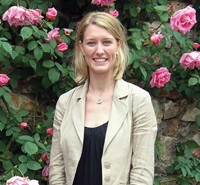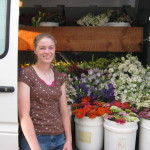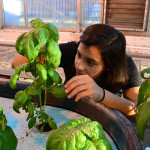
Finding Your Place — Emily Stefanski 2004
GPN/Nexus Intern of the Year scholarship winner, Emily Stefanski, a senior at Michigan State University (MSU), participates in so many organizations and activities, it’s hard to believe she has time for classes. Even with all of her activities, Stefanski managed to complete an internship at D.S. Cole Growers, Loudon, N.H., during the summer of 2003.
It’s amazing how much your body and mind can handle. No one knows this better than this year’s GPN/Nexus Intern of the Year scholarship winner, Emily Stefanski. Stefanski, a senior at Michigan State University (MSU), participates in so many organizations and activities, it’s hard to believe she has time for classes. She is a member and vice-president of the Michigan State University Horticulture Club and a member and previous communications officer of the Mid American Collegiate Horticulture Society. Stefanski also works several hours a week at MSU’s departmental flower shop, preparing floral arrangements, creating displays and performing other tasks involved in the running of the shop, and she also works for Floriculture Industry Research and Scholarship Trust (FIRST). Even with all of those activities, Stefanski managed to complete an internship at D.S. Cole Growers, Loudon, N.H., during the summer of 2003.
The MSU program requires its students to complete a 12-week internship to graduate. So, when searching for an internship, Stefanski kept a few things in mind: Though she’s worked in retail throughout her college career, she wanted to test the wholesale setting and hoped to work outside of Michigan. “I’ve lived and attended college in Michigan my whole life, so my horticulture internship was the perfect opportunity to live and work in a different part of the United States,” she said.
Through work and scholarships with FIRST, Stefanski met Doug Cole, who serves on the board of directors and owns D.S. Cole Growers. “After talking with Doug about D.S. Cole Growers, it sounded like the perfect opportunity to see a high-tech wholesale greenhouse operation, specializing in growing many varieties of vegetative annuals,” Stefanski said.
Art Cameron, Stefanski’s MSU advisor for two years, was a driving force in her college career and speaks very highly of her. “Emily is one of our top students in Horticulture at Michigan State University and is an active member (currently vice-president) of the Hort Club,” said Cameron. “I believe Emily will indeed be a leader in floriculture in the years to come. She’s smart, a go-getter, active in her student horticulture community and active in the Mid American Collegiate Horticultural Society.”
“She is truly interested in the industry,” added Cole. “You can see that from a lot of her past projects and interests.”
Getting Her Hands Dirty
Throughout her 12-week internship Stefanski focused on shipments and production. “By working in both departments, I was able to get a good grasp and understanding of the plant flow throughout the greenhouse from start to finish.” She was able to see and work with new plant material and new production methods. She worked in production on the days she finished in the shipping department early. While in production, she helped with spacing, pinching, watering, condensing hanging baskets, cleaning plants, sticking cuttings and inserting drip lines.
She learned quite a bit of new information in this production. For example, “With clay pots, I found it to be quite challenging to keep the plants at the right moisture level, since the clay pots allow for more evaporation than plastic,” she said. “Also new to me was the outdoor production of annuals. What an advantage it was to move a lot of the plant material outdoors to make space in the greenhouses; furthermore, I thought the quality of the plant material was nicer, since it had the opportunity to harden off.”
“She was eager to learn, and we tried to give her an idea within the different aspects of the business,” said Cole. “After a period of time went by, we gave her her own area for watering and growing, so she would have the day-to-day responsibility.”
Benefits of Internships
Of course, an internship will give students experience and knowledge, but Stefanski believes that there’s more to an internship than just credits toward a degree or pay. “You have to go above and beyond what you’re told to do; ask questions; be involved. Find out why you’re doing this, not just do it. And have fun with it.” Cole agrees that it’s a give/give situation. “We look at the intern’s interest level after they’re here for a while. The more they’re interested, the more we will put into their training,” he said. Á “Emily was definitely focused and interested, so we were happy to invest more time into her internship.”
“Being an intern myself at one time, my advice is to go there to learn; don’t go there to make money,” Cole said. “That doesn’t mean don’t make money, but learning should take priority.”
While it’s obvious the program is beneficial to the intern, there is so much that the employer could learn. “You get a fresh, new perspective with an intern,” says Stefanski. Even the intern’s education can help the employer. “In my classes, we’re seeing all of the big and upcoming trends in the industry and maybe they’re (the employer) not aware of them. Interns are a good way to get that information. I think it’s a win/win situation.”
But for employers, Cole suggests informing future interns of expectations prior to the internship. Let them know, vaguely, what you will demand from them. “We try to make sure they understand this, and we don’t get into problems later.”
Interns can also learn more than just the horticulture industry. Stefanski learned about life. “There were some employees who were Bosnian refugees; that was a change. Trying to work with different personalities is always a challenge. That was my first time living away from home. I definitely learned things about life,” said Stefanski. “My roommates were all from Europe so we were always commenting on the American way verses the European way. We learned a lot from each other.”
Stefanski is an advocate of the internship being required. “I had never worked in a wholesale greenhouse before, so I would have never known what to expect, and my [career] was heading that way,” says Stefanski. “But, after having the opportunity and comparing the two [retail and wholesale], I’m leaning more towards retail as a career.”
Future Plans
Stefanski graduates in May, and after her internship experience, has decided she would like to stick with retail production. She enjoys the customer interaction and the variety it brings. As a graduate, Stefanski is looking to build her resume, which she thinks most college graduates are looking for. “I’ve had four years of classes and some experience during that time, but we’re really lacking in experience,” she said. “Though you will start low on the totem poll after graduation, an internship will build your resume some.”
In regards to retaining recent graduates as employees, Stefanski has a few words of advice for employees. “Continuing education is what I’m looking for,” she said. “If they keep providing that I’d stay there forever. Continuing education, going to trade shows, supporting the industry, supporting a business management class or something similar is attractive.”







 Video Library
Video Library 




















